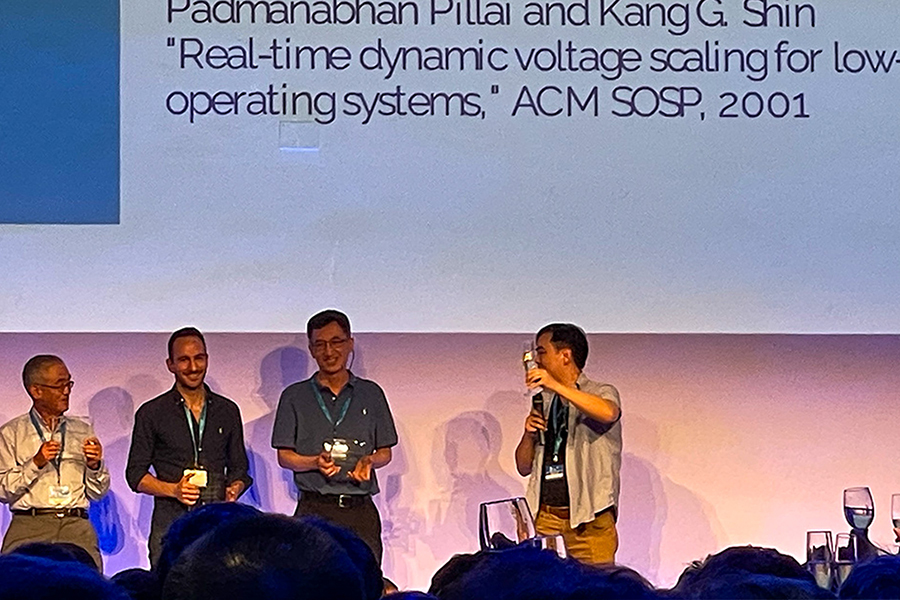Purdue University Prof. Y. Charlie Hu Receives Second Test-of-Time Paper Award for Pioneering Smartphone Energy Management Research

Smartphone battery life is much less of a problem today, but it was once the “elephant in the room” in the early years following the release of the iPhone in 2007. During the explosive adoption of smartphones and the rapid increase of mobile apps, many smartphone users routinely experienced severely shortened battery life, which limited the usability of the class of new computing devices.
While anecdotal evidence reported in online forums by smartphone users pointed fingers at power-hungry apps as the culprit, the mobile industry did not have a good solution for helping app developers debug and reduce the app battery drain. That was when Y. Charlie Hu, Michael and Katherine Birck Professor of ECE, and his team set out to tackle the problem.
Their research and resulting academic paper won the Best Student Paper award when it was presented at the ACM SIGOPS European Conference on Computer Systems 2012. The paper presented the first mobile app energy diagnosing tool that helps developers understand how they wrote the app source code affects how much the app drains the phone battery.
Last year, ten years after its publication, the paper received the 2022 ACM SIGOPS EuroSys Test-of-Time Award. ACM SIGOPS is one of ACM’s 39 Special Interests Groups (SIGs) on Operating Systems.
Now, one year later, that same paper – “Where is the energy spent inside my app? Fine grained energy accounting on smartphones with Eprof” – received its second Test-of-Time Award -- the 2023 ACM SIGMOBILE Test-of-Time Paper Award. ACM SIGMOBILE is ACM’s SIG on Mobile Computing.
In October, the SIGMOBILE award was given out at the 2023 ACM MobiCom Conference in Madrid, Spain. Professor Y. Charlie Hu accepted the award on behalf of his co-authors, former ECE student Abhinav Pathak (ECE Ph.D. ’12), who went on to lead a power team at Apple since graduation in 2012, and Dr. Ming Zhang, now at DataBricks.
“Test of Time awards are significant because they single out research that has had a lasting impact despite the rapid turnover in the computing field. And It is extremely rare that the same paper received the Test-of-Time awards from two ACM SIGs,” said Milind Kulkarni, interim Head of the Elmore School of ECE at Purdue University. “Prof. Charlie Hu has done pioneering and continuous ground-breaking work in mobile device energy management for well over a decade, and this award underscores the department’s reputation for innovation in areas such as mobile computing as well as computer systems and networking.”
The Test of Time Paper awards of ACM SIGMOBILE recognize papers that have had a sustained and significant impact in the SIGMOBILE community over at least a decade. A paper must have been published more than ten years ago to qualify.
The paper presents Eprof, the first fine-grained energy profiler for smartphone apps, which accurately breaks down the total battery drain of an app at the source code level and in doing so instantly pin-points energy “hotspots” in the app source code, so developers can zoom in and fix the “culprit” code segment that causes unexpected battery drain by the app.
According to Test-of-Time Paper award citation: “Eprof revolutionized the understanding of energy consumption within mobile applications by introducing app source code energy profiling. Using Eprof, the authors conducted an insightful analysis of popular apps at that time, uncovering that a substantial portion of energy drain was attributed to advertisements. Additionally, it identified and helped resolve ‘wakelock bugs, assisting app developers in eliminating energy leaks. As a result, this influential work significantly influenced the industry and its practices.”
“Using Eprof we conducted the first-ever insider look at how battery drain happens inside some of the most popular apps at the time, which revealed many surprising findings,” said Prof. Hu during his Test-of-Time Talk at the MobiCom conference in Madrid. One such finding is that the popular app AngryBirds spent almost 80% of its energy on ads and user tracking, which was widely reported in 2012 by news outlets around the globe, including ABC News, BBC News, Scientific American, MIT Tech Review, New Scientist, and Le Temps.
With 900 citations since its publication, the paper has inspired many avenues of follow-up research investigating energy profiling, energy debugging, and energy optimization techniques for mobile apps.
“But the most gratifying outcome of this work is to see the concept and techniques developed have directly or indirectly influenced various mobile app tools developed in the industry for helping app developers to debug, optimize, and manage the battery drain of millions of mobile apps running on people’s phones today,” said Prof. Hu.
